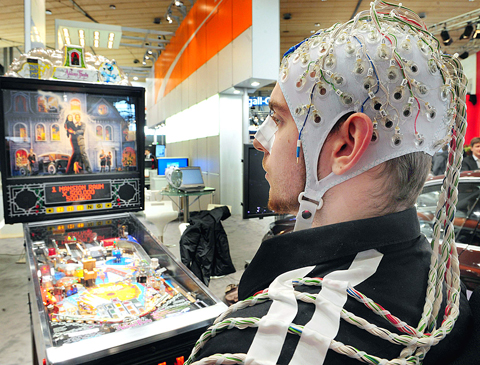Devices allowing people to write letters or play pinball using just the power of their brains have become a major draw at the world’s biggest high-tech fair.
Huge crowds at the CeBIT fair gathered round a man sitting at a pinball table, wearing a cap covered in electrodes attached to his head, who controlled the flippers with great proficiency without using hands.
“He thinks: left-hand or right-hand and the electrodes monitor the brain waves associated with that thought, send the information to a computer, which then moves the flippers,” said Michael Tangermann, from the Berlin Brain Computer Interface.

PHOTO: AFP
The technology is much more than a fun gadget — it could one day save your life.
Scientists are researching ways to monitor motorists’ brain waves to improve reaction times in a crash.
In an emergency stop situation, the brain activity kicks in on average around 200 milliseconds before even an alert driver can hit the brakes.
There is no question of braking automatically for a driver — “we would never take away that kind of control,” Tangermann said.
“However, there are various things the car can do in that crucial time, tighten the seat belt, for example,” he added.
Using this brain-wave monitoring technology, a car can also tell whether the driver is drowsy or not, potentially warning him or her to take a break.
At the g.tec stall, visitors watched a man with a similar “electrode cap” sat in front of a screen with a large keyboard, with the letters flashing in an ordered sequence.
The user concentrates hard when the chosen letter flashes and the brain waves stimulated at this exact moment are registered by the computer and the letter appears on the screen.
The technology takes a long time at present — it took the man around four minutes to write a five-lettered word — but researchers hope to speed it up in the near future.
Another device allows users to control robots by brain power. The small box has lights flashing at different frequencies at the four points of the compass.
The user concentrates on the corresponding light, depending on whether he wants the robot to move up, down, left or right and the brainwaves generated by viewing that frequency are monitored and the robot is controlled.
The technology is being perfected for physically disabled people, who can communicate and operate other devices using their brain.
“In future, people will be able to control wheelchairs, open doors and turn on their televisions with their minds,” Clemens Holzner from g.tec said.

Rainfall is expected to become more widespread and persistent across central and southern Taiwan over the next few days, with the effects of the weather patterns becoming most prominent between last night and tomorrow, the Central Weather Administration (CWA) said yesterday. Independent meteorologist Daniel Wu (吳德榮) said that based on the latest forecast models of the combination of a low-pressure system and southwesterly winds, rainfall and flooding are expected to continue in central and southern Taiwan from today to Sunday. The CWA also warned of flash floods, thunder and lightning, and strong gusts in these areas, as well as landslides and fallen

WAITING GAME: The US has so far only offered a ‘best rate tariff,’ which officials assume is about 15 percent, the same as Japan, a person familiar with the matter said Taiwan and the US have completed “technical consultations” regarding tariffs and a finalized rate is expected to be released soon, Executive Yuan spokeswoman Michelle Lee (李慧芝) told a news conference yesterday, as a 90-day pause on US President Donald Trump’s “reciprocal” tariffs is set to expire today. The two countries have reached a “certain degree of consensus” on issues such as tariffs, nontariff trade barriers, trade facilitation, supply chain resilience and economic security, Lee said. They also discussed opportunities for cooperation, investment and procurement, she said. A joint statement is still being negotiated and would be released once the US government has made

SOUTH CHINA SEA? The Philippine president spoke of adding more classrooms and power plants, while skipping tensions with China over disputed areas Philippine President Ferdinand Marcos Jr yesterday blasted “useless and crumbling” flood control projects in a state of the nation address that focused on domestic issues after a months-long feud with his vice president. Addressing a joint session of congress after days of rain that left at least 31 dead, Marcos repeated his recent warning that the nation faced a climate change-driven “new normal,” while pledging to investigate publicly funded projects that had failed. “Let’s not pretend, the people know that these projects can breed corruption. Kickbacks ... for the boys,” he said, citing houses that were “swept away” by the floods. “Someone has

‘CRUDE’: The potential countermeasure is in response to South Africa renaming Taiwan’s representative offices and the insistence that it move out of Pretoria Taiwan is considering banning exports of semiconductors to South Africa after the latter unilaterally downgraded and changed the names of Taiwan’s two representative offices, the Ministry of Foreign Affairs (MOFA) said yesterday. On Monday last week, the South African Department of International Relations and Cooperation unilaterally released a statement saying that, as of April 1, the Taipei Liaison Offices in Pretoria and Cape Town had been renamed the “Taipei Commercial Office in Johannesburg” and the “Taipei Commercial Office in Cape Town.” Citing UN General Assembly Resolution 2758, it said that South Africa “recognizes the People’s Republic of China (PRC) as the sole